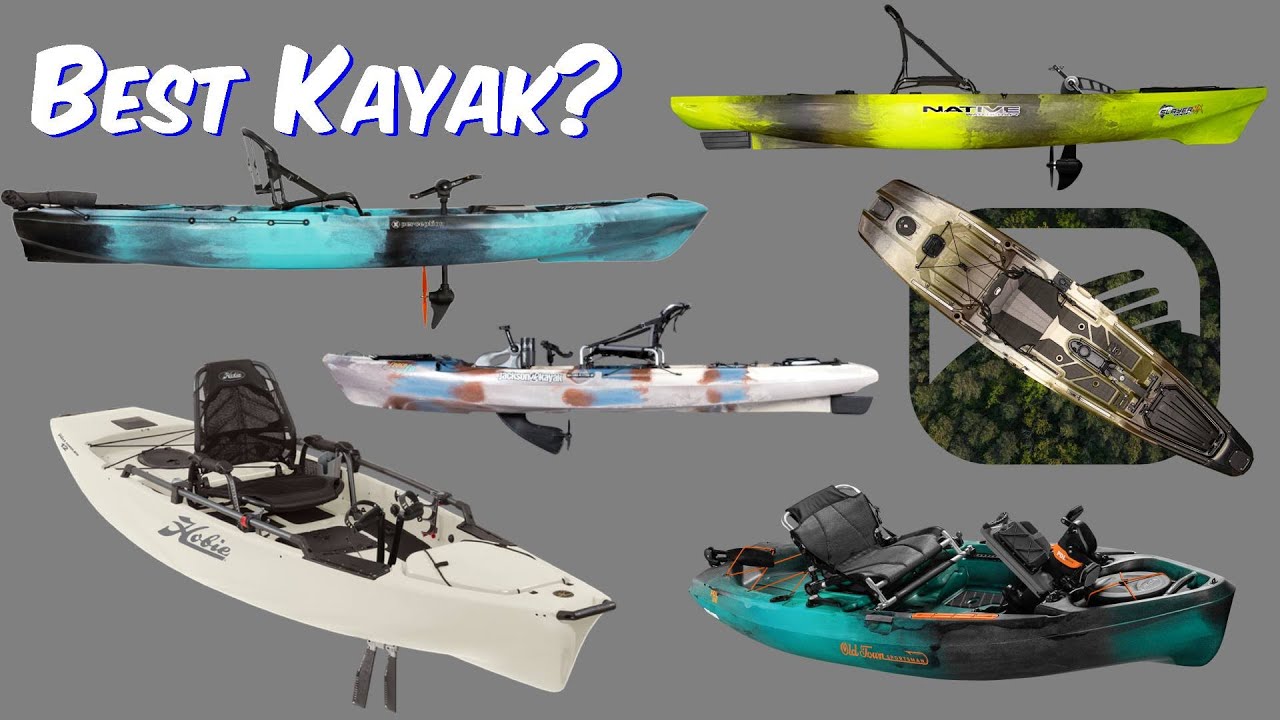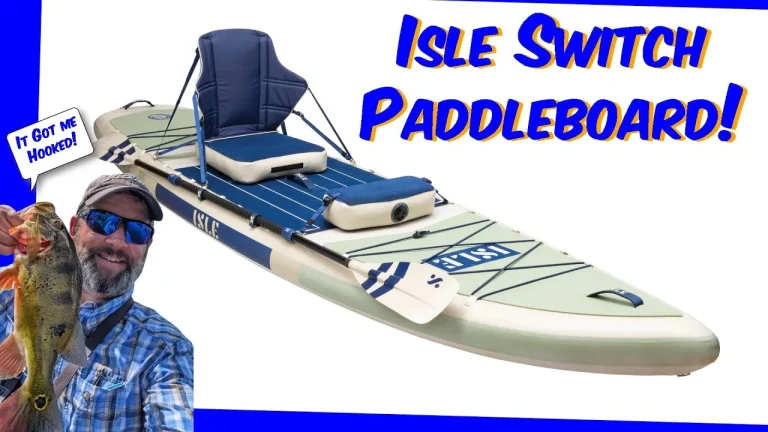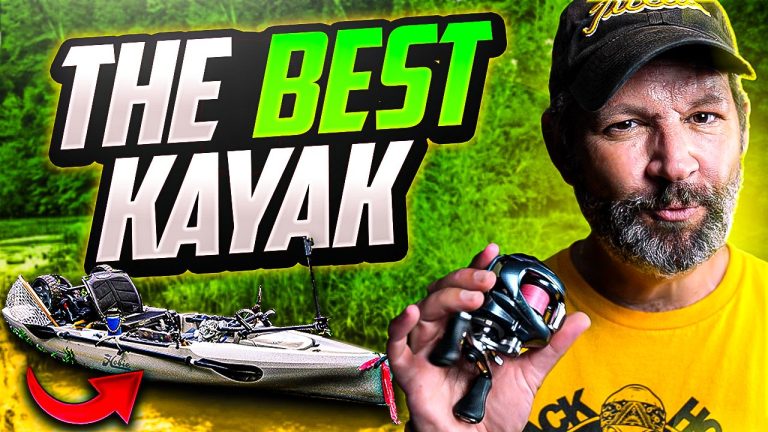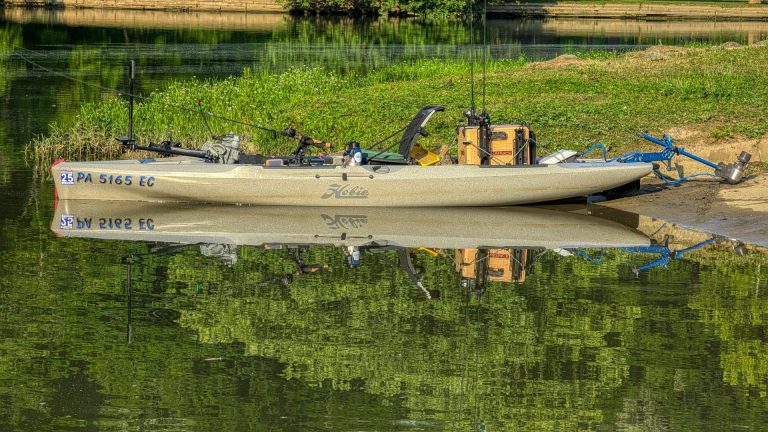The Best Fishing Kayak? One Angler’s Perspective on 5 kayak models
Navigating the ocean of kayak choices to pinpoint your ideal fishing companion is no easy feat. As someone who’s just as passionate about that early morning tranquility on the water, with the promise of a nibble on my line, I understand what it means to look for a ride that matches our enthusiasm.
From my escapades among more than 38 million American anglers embracing this pastime, I’ve uncovered that pedal drive kayaks often rise to the surface in these searches. Stay with me as we embark on this adventure—I’m excited to share insights and maybe even help you land the fishing kayak that truly resonates with your aquatic aspirations.
Key Takeaways
- Pedal drive kayaks let you use your hands for fishing while moving.
- They can be heavy, cost more, and need extra care.
- Choosing a kayak depends on where and how you like to fish.
- Some kayaks have pedal drives that help with river fishing
- Others might get stuck in weeds.
- It’s important to think about money and what features you need.
Table of Contents
The decision to buy a pedal drive kayak for the upcoming fishing season
I want a pedal fishing kayak for this year’s fishing adventures. With a pedal drive, my hands are free to cast and reel in big catches. I look for ease of use, comfort, and something that lets me stay in one spot without paddling against currents or winds.
My focus is on a sit-on-top fishing kayak because it offers stability and room to move.
Choosing the right angler kayak matters a lot for having fun and staying safe on the water. Next, I’ll dive into what makes these kayaks good or not so good for someone who loves to fish.
Importance of choosing the best fishing kayak
Choosing to buy a pedal drive kayak means thinking hard about what I need. A good fishing kayak will be my buddy on the water. It has to fit me well, hold all my gear, and move smoothly through the water.
Picking the right one can make my fishing trips better. I’ll spend less time fixing problems and more time catching fish. The best fishing kayak must not tip over easily and should let me reach spots where big fish hide without scaring them away.
It’s smart to get a kayak that matches how I like to fish—whether it’s close to shore or out in deeper water.
Pros and Cons of Pedal Drive Kayaks
I just decided to get a pedal fishing kayak for catching fish this season. It’s important I pick the right one.
- You can use your hands to cast and reel in while still moving because your legs do the work.
- It’s easy to stay in one spot, even when the water moves or the wind blows.
- Pedal kayaks help you move faster and don’t make you as tired as paddling does.
- They need more care. You have to keep the pedal system clean and working well.
- These kayaks cost more money than regular ones you paddle with your arms.
- They are heavier, which makes them harder to carry and put on top of your car.
Hands-free movement for anglers
For anglers, hands-free movement in a pedal fishing kayak is a game-changer. Using the foot pedals to propel the kayak leaves my hands free for casting and reeling in fish. It’s efficient and allows me to cover more water while focusing on fishing.
The convenience of hands-free movement enhances my overall fishing experience, making it easier to maneuver through different spots without sacrificing control over my gear.
Now let’s dive into the pros and cons of pedal drive kayaks!
Ease of use and ability to hold position
Pedal-drive kayaks offer easy movement for anglers. They let me fish without paddling, so I can focus on my catch. The pedal system helps me hold a position in the water, especially when I’m casting or reeling in a big one.
This way, I can stay where the fish are biting and have better control over my fishing spot.
The hands-free feature of pedal drive kayaks is a game-changer for any angler. It allows me to keep my hands free while adjusting my fishing gear or managing multiple lines. Plus, being able to hold positions effortlessly gives me more time to concentrate on fishing instead of constantly adjusting my kayak’s location.
Efficiency and reduced physical strain
When choosing a pedal drive kayak, I always consider the efficiency and reduced physical strain it offers. Fishing demands long hours on the water, so having a kayak that allows me to cover more ground with less effort is crucial.
The pedal drive system not only gives me the freedom to use my hands for fishing gear but also reduces the strain on my arms from paddling, making my fishing experience more enjoyable and less tiring.
The ease of using a pedal drive kayak makes it an efficient choice for anglers who want to navigate waters without getting too exhausted. This feature enhances the overall fishing experience by allowing me to focus on finding the best spots and reeling in those big catches without feeling physically drained.
Drawbacks: extra maintenance, higher cost, and increased weight
While pedal-drive kayaks offer efficiency and reduced physical strain, they do come with some drawbacks to consider. These kayaks generally require extra maintenance due to their complex propulsion systems.
Additionally, the advanced technology and features in pedal drive kayaks often result in a higher cost compared to traditional paddle kayaks. It’s also important to note that pedal drive systems can increase the overall weight of the kayak, which may pose challenges during transportation and handling.
These factors should be carefully weighed against the benefits when making a decision.
Preferences, needs, and budget as deciding factors
After setting a target budget of $2500 or less for the kayak purchase, I carefully considered my preferences, needs, and budget as deciding factors. Here are the key considerations I suggest you evaluate before buying a kayak:
- Fishing Environment: Evaluate the primary fishing environment, such as lakes, rivers, or oceans, to determine the most suitable kayak type.
- Storage and Transportation: Consider the available storage space and transportation methods to ensure the chosen kayak fits your practical needs.
- Fishing Style: Determine your preferred fishing style – whether you need stability for casting or maneuverability for navigating different water conditions.
- Additional Features: Assess the importance of additional features such as built-in rod holders, storage compartments, or customizable rigging options based on your fishing gear and equipment.
- Comfort and Ergonomics: Prioritize comfort and ergonomic design to ensure an enjoyable fishing experience without physical strain during long hours on the water.
- Quality and Durability: Research customer reviews and expert opinions to gauge the quality and durability of the chosen kayak model for a reliable investment.
- Trial Opportunities: Whenever possible, explore opportunities to test different kayak models on the water to assess their performance in real fishing scenarios before making a final decision.
- Future Expansion: Consider potential future expansion of fishing activities or participation in tournaments to ensure the chosen kayak can adapt to evolving angling needs.
Consideration of Various Pedal Drive Kayak Models
When considering different pedal drive kayak models, I have weighed the options based on my fishing needs. The Old Town Sportsman PDL is popular among fishing YouTubers and offers durability, but comes with a premium price point.
The Jackson Coosa FD provides stability for river fishing and features a unique bicycle pedal-style drive; however, there are concerns about the propeller getting tangled in weeds.
Another option to ponder is the Native Slayer which has interchangeability with other kayaks and moderate pricing. Then there’s the Pescador Pilot – known for its popularity in Australian sites – offering lower cost with stripped-down features, yet potential quality issues need consideration.
Lastly, the Hobie Mirage Outback boasts many benefits but raises concerns about size and foot motion that must be factored into decision-making.
Old Town Sportsman PDL

I tried the Old Town Sportsman PDL kayak. It’s a popular choice among fishing YouTubers. I was drawn to its durability and potential drawbacks, but it comes at a premium price point.
The interchangeability with other kayaks is something to consider too.
The pedal drive system gave me hands-free movement while fishing. The stability on the water was excellent due to its design. But, keep in mind, it might not be ideal for those looking for a more stripped-down kayak or have budget constraints.
Despite some concerns, like any product, there are trade-offs that every angler needs to weigh before making their decision.
Popularity among fishing YouTubers
Now, let’s talk about the popularity of the Old Town Sportsman PDL among fishing YouTubers. Channels like Creek Fishing Adventures and 618 FIshign are where I first saw the Old Town PDL in action.
Many anglers praise its durability and performance out on the water. The pedal drive system gets a lot of attention for its hands-free operation, allowing fishing enthusiasts to focus more on their catch.
Its premium price point is a concern for some, but those who value reliability and efficiency seem to find it worth the investment.
Durability and potential drawbacks
When considering the durability of pedal-drive kayaks, it’s essential to factor in the frequency and type of fishing trips. While popular models like the Old Town Sportsman PDL offer sturdy construction, their complexity may lead to potential maintenance issues, especially with the pedal drive system.
Additionally, their premium price point can become a drawback for anglers on a tighter budget. It provides excellent stability for river fishing but may face concerns about its propeller getting entangled in weeds, impacting its overall durability.
These factors should be weighed against an angler’s specific needs and priorities before making a final decision.
Jackson Coosa FD

I chose to consider the Jackson Coosa FD for its stability, particularly since I often fish in rivers with varying currents. This kayak’s unique bicycle pedal-style drive caught my attention as it offers hands-free fishing without sacrificing maneuverability.
However, one concern that arises is the possibility of the propeller getting tangled in weeds, which could potentially interrupt an exciting catch. Nevertheless, with its stability and specialized propulsion system, the Jackson Coosa FD is truly a contender as the best fishing kayak for my needs.
As I deliberated over various fishing kayak models, including sit-on-top and pedal-driven options, evaluating each against my angling preferences and budget was crucial. The Jackson Coosa FD stood out due to its specific features catering to river fishing enthusiasts like myself. It handles rough water well. It cuts through current.
While cost and maintenance are always factors to weigh when deciding on a premium kayak model like this one, this kayak certainly warrants consideration due to its tailored design for river angling expeditions.
Stability for river fishing
Stability is crucial when fishing in rivers. A kayak with good stability gives me more confidence to navigate varying currents and avoid capsizing. It helps in maintaining balance when casting lines or reeling in a catch, especially during river fishing where the water flow can be unpredictable.
Additionally, a stable kayak allows for better positioning while battling against river currents and ensures a safer and more enjoyable fishing experience. The Coosa FD seems to be very stable.
Unique bicycle pedal-style drive
The Jackson Coosa FD kayak caught my attention with its unique bicycle pedal-style drive. What makes it unique is that it will retract into the hull if it hits something underwater – unlike the Native and Old Twon drives which are fixed.
Concerns about the propeller getting tangled in weeds
After looking into the bicycle pedal-style drive of the Jackson Coosa FD, I came across some concerns about its propeller potentially getting tangled in weeds. This is a significant worry for any angler who fishes in areas with dense aquatic vegetation, as it could cause not only frustration but also potential damage to the kayak’s propulsion system.
Kayak anglers must consider this issue and weigh it against the benefits of the pedal drive system when making their decision.
I understand that finding a reliable fishing kayak is essential for an uninterrupted fishing experience. Therefore, evaluating potential issues like propeller entanglement is crucial before investing in a particular model.
For me, if I could avoid that issue, it would be worth it.
Native Slayer
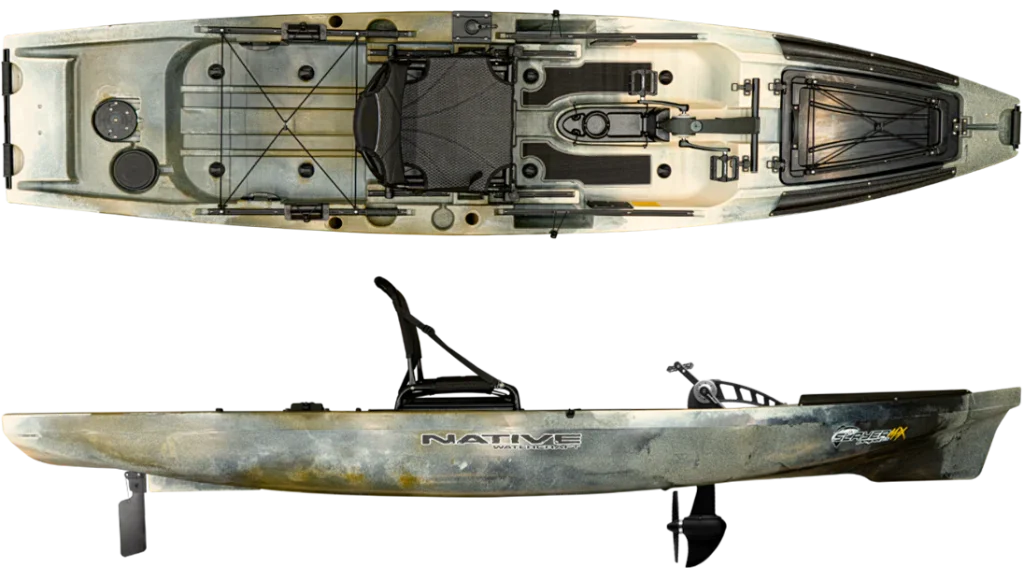
Transitioning from concerns about propellers getting tangled in weeds to the Native Slayer, it also has a prop-style drive. So similar concerns there. But all of them offer the ability to lift the drive to clear the weeds.
One benefit to this style of drive is in the event you get a fish wrapped in the drive – you may be able to more easily land the fish through the drive hole. In the case of the mirage-style fin drives like the Hobie uses this is a little more difficult to manage. The narrow slot would make it nearly impossible to land even a moderate-sized fish through that hole.
The moderate pricing of the Native Slayer also makes it an attractive option without compromising on quality or features. Its similarity to other popular models like Old Town and Jackson provides a sense of reliability while offering its unique advantages.
The Native Slayer’s stability and interchangeable design make it suitable for various fishing situations, whether in rivers, oceans, or lakes. This kayak is particularly appealing for anglers looking for a versatile and durable option at a reasonable price point.
With its range of features and adaptability, the Native Slayer presents itself as a strong contender for my upcoming fishing kayak purchase.
Interchangeability with other kayaks
When considering a fishing kayak, it’s important to think about how it fits with other kayaks you may already own or plan to have. The Native Slayer offers interchangeability with accessories and parts from Old Town and Jackson, making it convenient for anglers who want flexibility without buying all new gear.
This feature allows me to personalize my kayak setup while still having the option to switch things up as needed, giving me the freedom to adapt my fishing experience without being limited by specific brand constraints or accessories.
Similarities with Old Town and Jackson models
In comparing the Old Town Sportsman PDL and the Jackson Coosa FD, I noticed they both provide exceptional stability on the water. The pedal propulsion system in both models allows for hands-free fishing, making it easier to focus on reeling in a big catch.
Additionally, these kayaks boast high durability and are well-suited for anglers who prioritize stability and comfort during their fishing trips.
The Native Slayer also shares similarities with these two models, offering interchangeability like the Old Town and featuring a unique bicycle pedal-style drive similar to the Jackson Coosa FD.
So all three are viable options for anglers seeking versatility and efficient movement on the water without compromising on stability.
Moderate pricing
The Native Slayer offers good features at a moderate price. Its interchangeability with other kayaks gives added value and flexibility. The kayak’s similarity to more expensive models makes it an appealing choice for those looking for quality without breaking the bank.
When considering the budget, this kayak stands out as a practical yet reliable option.
I then moved on to weigh my final decision and budget considerations, taking into account all factors regarding affordability and needs for my upcoming fishing season in mind.
Pescador Pilot

I picked the Pescador Pilot because of its lower cost and stripped-down features. It’s been popular on Australian sites, but I did consider potential quality issues before making my decision.
The kayak seemed like a good fit for me due to its moderate pricing as well as interchangeability with other kayak brand accesories. However, it was important for me to weigh the pros and cons carefully before finalizing my choice.
As an angler looking for a reliable fishing kayak, I knew that I wanted one that would meet my needs without breaking the bank. The Pescador Pilot offered an attractive option with its affordability and basic functionality, but I didn’t overlook the quality concerns either.
Australian site popularity
When researching fishing kayaks, I found that the Pescador Pilot is quite popular Down Under. It offers a good balance of features and affordability that appeals to many anglers.
The lower cost and stripped-down features make it an attractive option for those looking for a reliable pedal kayak on a tighter budget. However, there are some considerations about potential quality issues that need to be weighed carefully when making the decision.
Lower cost and stripped-down features
Looking at the Pescador Pilot, it offers a decent pedal kayak option without costing an arm and a leg. This model may lack some of the bells and whistles of higher-priced kayaks, but it gets the job done without burning a hole in your pocket.
While you might miss out on extra features, its lower cost gives you an entryway into the world of pedal fishing kayaks.
If budget is a significant concern for you, this stripped-down yet functional option could be worth considering. Even though it doesn’t boast all the fancy add-ons, it still delivers on its essential purpose – getting you out on the water with minimal hassle and expense.
Moving Water Performance
One of the strengths of the Pescador Pilot is its hull design for moving water. It’s a bit narrower and cuts through the ware better than the wider, barge-like fishing kayaks. This is another reason I really considered this model.
Consideration of potential quality issues
As I contemplated the cheaper options and simplified features of different kayak models, it became important to consider potential quality issues that could arise. Durability is crucial for a fishing kayak, so looking for reliable construction materials is key.
Another aspect to weigh in on is the performance and maintenance of pedal drive systems, as they can be susceptible to wear and tear over time. But this is true of all pedal-drive systems.
It’s also necessary to pay attention to customer feedback and reviews about any potential recurring problems with specific kayak models before making a final decision.
So, considering these factors becomes imperative in ensuring that my expenditure in a fishing kayak turns out to be durable, efficient, and worth every penny spent on it.
Hobie Mirage Outback

After considering some budget options, I turned my attention to the Hobie Mirage Outback. This pedal-drive fishing kayak caught my eye with its exceptional features and benefits. The stability of the Hobie Mirage Outback is impressive, providing a solid platform for casting lines and reeling in fish.
It also offers easy maneuverability, allowing me to navigate through various water conditions with confidence.
The comfortable seating and ample storage space make it an ideal choice for longer fishing trips. However, I did have some concerns about its size and foot motion which could affect overall comfort during long hours on the water.
Nevertheless, the advanced features and overall performance of the Hobie Mirage Outback make it a strong contender in my search for the best fishing kayak within my budget range.
Features and Benefits
After considering various pedal drive kayak models like the Hobie Mirage Outback, I found that its standout features and benefits make it a strong contender for anglers. The MirageDrive system provides effortless and efficient propulsion, allowing me to cover more water with less effort.
But two features make the Mirage Drive stand out for me:
- The Kick Up Fins
- Shallow Water Capability
The kick-up fin design allows the fins to flip out of the way when you hit an obstacle. Since I fish a lot of shallower creeks and rivers, and also have some lakes with a lot of tree stumps, this seemed like a key feature for my style of fishing.
And speaking of shallow water – the Mirage Drive can ‘flutter’ so you can still get propulsion in fairly shallow water – about 8″ or so in my experience. Which gives me about six more inches of shallow water running ability. Gain, in shallow creeks and rivers this is a big deal.
Its stability on the water gives me confidence while fishing and the comfortable seating ensures I can spend long hours on the kayak without feeling fatigued. It seems to be one of the more efficient designs for kayaking upstream – critical for single-access river trips.
Additionally, the ample storage space lets me bring along all my fishing gear and equipment for a successful fishing trip.
In my search for the best fishing kayak, these key features and benefits stood out to me: effortless propulsion with the MirageDrive system, excellent stability on the water, shallow water capability, comfortable seating for long fishing trips, and ample storage space for all my gear.
Concerns about size and foot motion
Size and foot motion are essential in a fishing kayak. A bulky kayak can be difficult to transport, launch, and maneuver. It’s important to consider the size of the kayak with your physical abilities.
Additionally, foot motion is crucial as it directly affects your control over the pedal drive system. I found that ensuring ample room for comfortable foot positioning greatly contributes to a smoother and more efficient fishing experience.
In my search for the best fishing kayak, I carefully evaluated various models based on their dimensions and how well they accommodated my body size and movement. The concern about size and foot motion led me to prioritize kayaks that offered sufficient space without compromising on stability or ease of pedaling, ultimately enhancing my overall angling experience.
The Hobie back-and-forth motion is more efficient than the bicycle-style pedals. But it comes with a drawback: No instantaneous reverse. To put the Hobie Mirage Drive into reverse you must pull a cable. And then pull a different cable to get back into forward.
Honestly, this was my biggest concern about the Hobie. Well, that and the price. It’s about the most expensive kayak on the short list as well.
Decision-making factors for the angler
Considering the decision-making factors for choosing the best fishing kayak, stability, and maneuverability are key when out on the water. The size of the kayak should suit your body comfortably while ensuring ample space for gear storage.
Additionally, ease of pedal operation or paddle use is crucial for a smooth angling experience. Weight and portability also matter, especially if you plan to transport your kayak frequently.
How well it suits the kind of water you fish is also an important consideration.
Lastly, considering your budget in line with desired features helps in making an informed decision about which model would be ideal for your fishing adventures.
Now let’s move on to weighing the pros and cons of different pedal drive kayak models to narrow down our choices further.
Final Decision and Budget Considerations
After weighing the pros and cons of various pedal-drive kayaks, I decided to buy the Hobie Outback. Although it comes with a premium price tag, its durability and features make it worth the investment. The biggest factor was the kick-up fins and shallow water capability.
As for budget considerations, I’m willing to stretch my budget a bit to get a kayak that meets my needs and preferences. My priority is value for money rather than just the lowest cost option because this will be an essential tool for my fishing adventures.
Target budget for the kayak purchase
I set my target budget for the kayak purchase at around $1500 to $2500, aiming for a good balance between quality and affordability. Considering factors like stability, pedal drive system, durability, and features suitable for fishing excursions, this budget range seems realistic for securing a reliable fishing kayak without breaking the bank.
But, after deciding on the Hobie and it’s $3,400 MSRP, I had to look for a deal. This is where your local kayakd dealer comes into play.
They may have demo models that will save you some money. If you’re buying out of season, you can get a killer deal. Which is what I did. I picked up a brand new Hobie Outback in the middle of winter for my $2500 target price.
Other Fishing Kayak Models to consider
I’ll keep adding other models to this list to make it as comprehensive as possible. I’m also hoping to connect with local kayak anglers and maybe get some hands-on reviews with heir set-ups as well.
Share your favorite kayak models
I’m open to hearing about your experiences and learning from fellow anglers. Let’s build a community where we can exchange valuable information to enhance our fishing adventures.
I’m eager to hear about your preferred fishing kayak models and the reasons behind your choices. Feel free to share insights on the features, stability, efficiency, and durability of the kayaks you love using for angling adventures.
Your input could be valuable for fellow anglers in finding their ideal fishing kayak. Don’t hesitate to contribute your experiences and thoughts as we all navigate through the sea of options when it comes to selecting the best fishing kayak for our needs.
FAQs

